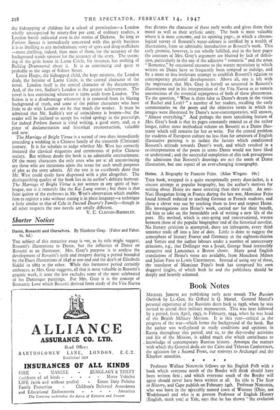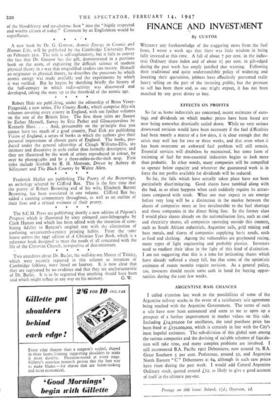• Book Notes
MICHAEL JOSEPH are publishing early next month The Russian Outlook by Lt.-Gen. Sir Giffard le Q. Martel. General Martel's personal experience of the Russians dates back to 1936, when he Was invited to attend their military manoeuvres. This was later followed by a period, from April, 1943, to February, 1944, when he was head of the British Military Mission. It is this year—critical in the progress of the war—which forms the background of the book. But the author was well-placed to study conditions and opinions in Russia throughout this period, and so, to the day-to-day activities and life of the Mission, is added much else which contributes to knowledge of contemporary Russian history. Amongst the matters with which the General deals are the Cairo and Teheran Conferences, the agitation fora Second Front, our convoys to Archangel and the Kharkov atrocities.
• * * * ' * Professor Wallace Notestein follows up his English Folk with a book which everyone north of the Border will think should have been written first ; and which everyone south of the Border will agree should never have been written at all. Its title is The Scot in History, and Cape publish on February 24th. Professor Notestein, who was born in the aireeably named town of Wooster (Ohio, not Wodehouse) and who is at present Professor of English .History (English, mark you) at Yale, says that he has shown "the evolution of the bloodthirsty and treacherous Scot" into the "highly respected and worthy citizen of today." Comment by an Englishman would be superfluous.
*
A new book by Dr. G. Gamow, Atomic Energy in Cosmic and Human Life, will be publi-thed by the. Cambridge University Press on February 2I3t. The title is self-explanatory, but it fails to convey the fact that Dr. Gamow ha; the gift, demonstrated in a previous book on the atom, of explaining the difficult science of modern physical theory in a way that unqualified readers can master. Himself an originator in physical theory, he describes the processes by which atomic energy was made available and the experiments by which it was verified. But he begins by sketching briefly the history of the half-century in which radio-activity was discovered and developed, taking the story up to the threshold of the atomic age.
Robert Hale are publishing, under the editorship of Brian Vesey- Fitzgerald, a new series, The County Books, which comprise fifty-six volumes covering every county in England, with ten further volumes on the rest of the British Isles. The first three titles are Sussex by Esther Meynell, Surrey by Eric Parker and Gloucestershire by Kenneth Hare. . . . And, presumably on the principle that you cannot have too much of a good country, Paul Elek are publishing Vision of England, a series of books in which the authors give their personal impressions of chosen parts of England. The books, pro- duced under the general editorship of Clough Williams-Ellis, are intimate and discursive in style rather than formally descriptive, and they are illustrated by the work of artists reproduced in colour, by over 60 photographs and by a three-miles-to-the-inch map. First titles include Norfolk by R. H. Mottrarn, Dorset by Aubrey de Selincourt and The Black Country by Walter Allen.
Frederick Muller are publishing The Poetry of the Brownings, an anthology selected by Clifford Bax. This is the first time that the poetry of Robert Browning and of his wife, Elizabeth Barrett Browning, has been associated in one volume. Clifford Bax ha, added a running commentary throughout, as well as an outline of their lives and a critical estimate of their poetry.
The S.C.M. Press are publishing shortly a new edition of Pilgrim's Progress which is illustrated by sixty coloured auto-lithographs by Clark Hutton and which has beers edited with the intention of com- bining fidelity to Bunyan's original text with the elimination of confusing seventeenth-century printing habits. From the same house comes the 1947 edition of A Christian Year Book, which is a reference book designed to meet the needs of all concerned with the life of the Christian Church, irrespective of denomination.
• Two anecdotes about Dr. Bu:ler, the well-known Master of Trinity, which were recently repeated in this column as instances of Cambridge folklore, were based on hearsay. It is now clear that they are supported by no evidence and that they are uncharacteristic of Dr. Butlee. It is to be regretted that anything should have been said which might reflect in any way on his memory. - G. W.



































 Previous page
Previous page